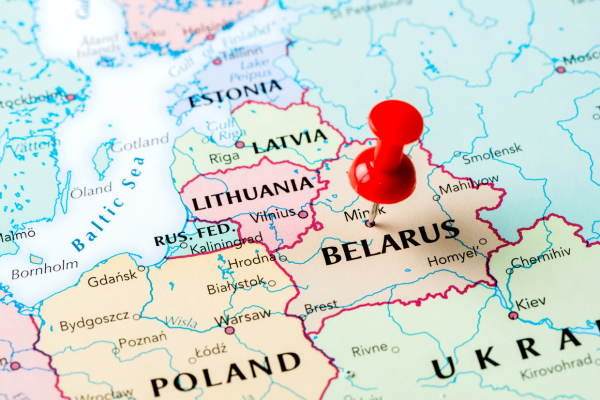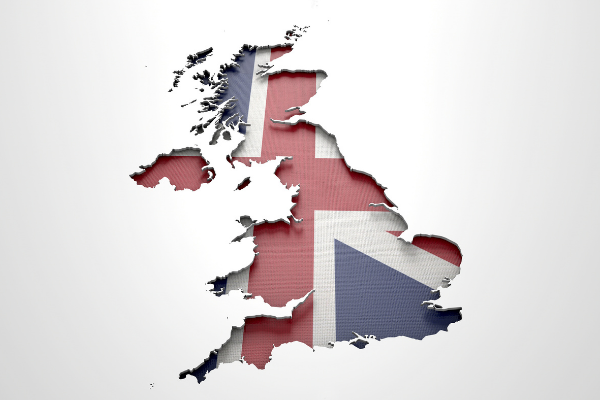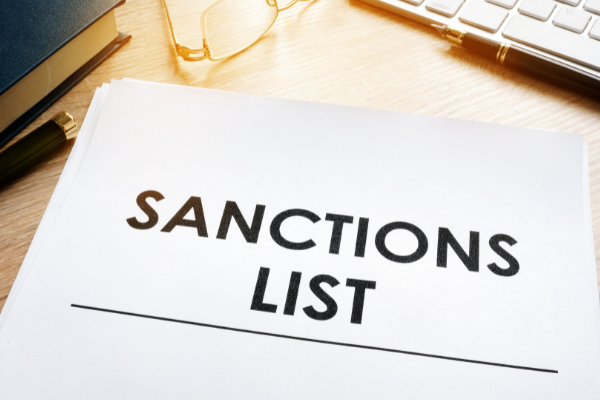BY:
SHARE:

The Department of Business and Trade has issued an update to the regulations relating to the imports of certain commodities originating in or consigned from Belarus in Notice to Exporters 2952, issued on 16th May 2024.
The notice provides an overview of the import prohibitions in force on certain goods imported into the UK (this includes Northern Ireland), where the goods originated in or are consigned from the Republic of Belarus. It also provides more detail on goods-related prohibitions that will affect UK importers.
The notice also clarifies the licensing process for traders looking to import goods subject to these prohibitions. Determining whether a licence may be required can be difficult for traders, and the rule of thumb is that when in doubt, apply for a licence. Further details on the process are provided later in this article.
A link to the related statutory guidance is below:
Republic of Belarus sanctions: guidance - GOV.UK (www.gov.uk)
Note: The NTI has no legal effect in its own right. Where the NTI conflicts with the statutory guidance published by the FCDO, the statutory guidance will prevail.
Import prohibitions: Keeping up with the changes in the regulations. Regulatory update of 16th May 2024, prohibiting imports from Belarus:
The amendment to the Belarus Sanctions regulation extends the existing import sanctions by prohibiting the imports into the UK of aluminium, arms and related material, iron and steel products, mineral products, potash, gold and gold jewellery, relevant processed gold, rubber, cement, and wood into the UK.
The link to the regulation is below:
The Sanctions (EU Exit) (Miscellaneous Amendments and Revocations) Regulations 2024,
Regulation 27I: To be found in PART 3A - Director disqualification sanctions of the amendment schedule.
Regulation 27I prohibits the import of the following:
- Aluminium
- arms and related material
- iron and steel products
- mineral products
- potash
- gold and gold jewellery
- relevant processed gold
- rubber
- cement
- wood
The prohibition covers goods that either originate in Belarus or are consigned from Belarus. Therefore, it will be essential to establish the origin of the goods listed below, as the prohibition will apply if the goods were not immediately consigned from Belarus. Compliance with due diligence will be essential for traders dealing in these commodities.
Specifically, goods captured sit within the UK Global Tariff commodity codes below.
- aluminium: this means anything falling within the commodity code 76
- arms and related material: this includes all military goods as defined in Schedule 2 to the Export Control Order 2008, and anything falling within chapter 93 of the Goods Classification table, other than military goods
- cement: this means anything falling within the following commodity codes: 2523 and 6810 and meeting the descriptions within the table given below in paragraph 2(b) of Part 2 of Schedule 2J to the Belarus Sanctions Regulations
- gold: this means anything falling within the following commodity codes: 10000, 7108 and 71129, and ex 7118 9000 and meeting the descriptions within the table given below in paragraph 3(b) of Part 2 of Schedule 2J to the Belarus Sanctions Regulations
- gold jewellery: this means anything falling within the following commodity codes: Ex 7113 and Ex 7114 and meeting the descriptions within the table in paragraph 4(b) of Schedule 2J to the Belarus Sanctions Regulations
- Relevant processed gold: This means gold that has been processed in a third country and incorporates gold that originated in Belarus on or after 21st July 2022 and has been exported from Belarus. Therefore, compliance evidence must be readily available to support importing goods that fall into this compliance position.
- mineral products: this means anything which falls within the following commodity codes: 2707, 2710; 2711, 2712; 2713, 2715
- iron and steel products: this means anything falling within the commodity codes in chapters 72 and 73
- potash: anything that falls within the following commodity codes: 31042010; 31042050; 31042090; 31052010; 31052090; 31056000; and ex. 31059020 or ex. 31059080, provided in each case that this is a fertiliser containing potassium chloride
- rubber: this means anything falling within the commodity code 4011 and meeting the description within the table in paragraph 5(b) of Part 2 of Schedule 2J to the Belarus Sanctions Regulations
- wood: this means anything falling within the commodity code 44 and meeting the description within the table in paragraph 6(b) of Part 2 of Schedule 2J to the Belarus Sanctions Regulations
Regulations 27J-M
Provision for further exacting prohibitions relating to the goods are published in Regulation 27J to 27M within the same schedule. Understanding that these further restrictive measures listed within 27J-M must also be considered concerning restricted goods will be essential.
Exceptions
The Belarus Sanctions Regulations (as amended) also set out exceptions to the trade prohibitions.
Regulations applying in certain defined circumstances are:
- Regulation 30A concerning licences or other authorisations issued by the Channel Islands, Isle of Man, or any British overseas territory
- Regulation 31 concerning acts determined by a responsible officer to be in the interests of national security or prevention or detection of serious crime in the UK or elsewhere
- Regulation 31C concerning activity (including imports) relating to purchases in Belarus of mineral products which are required by an individual on a retail basis, for that individual’s personal use, or solely for the performance of any humanitarian assistance activity in Belarus
- Regulation 31D concerning activity (including imports) relating to gold and gold jewellery and relevant processed gold which is necessary for the official purposes of a diplomatic mission or consular post in Belarus or an international organisation enjoying immunities following international law
- Regulation 31D concerning activity related to gold jewellery, where the jewellery is for personal use and owned by the natural person importing it or an immediate family member travelling with them to the UK, contained in their luggage, provided that the jewellery is not intended for sale.
Technical Note: An exception applies automatically and does not require obtaining a licence for activity that falls within scope.
Trade sanctions licences
A licence is a written authorisation from the UK authorities (Department of Business and Trade) that permits an otherwise prohibited activity.
The Import Licensing Branch (ILB) administers the licensing provisions for all import sanctions on behalf of the Secretary of State.
The Export Control Joint Unit (ECJU) administers all other licensing provisions for trade sanctions.
Where traders are looking to import any prohibited goods and where an exception does not apply, applications for licences can be made at the following link,
ILB’s Import Case Management System (ICMS).
Then follow these steps:
- ICMS registration will be necessary, and an importer access request will be made.
- Contact Import Controls at importcontrols@businessandtrade.gov.uk with details of your proposed activity for further instruction.
- Each application is considered on a case-by-case basis. This determines whether granting a licence would be consistent with the stated purposes of the sanctions’ regime and any UN or other relevant international law obligations.
The Secretary of State for Business and Trade is ultimately responsible for decisions to grant or refuse a trade sanctions licence in any individual case.
Technical Notes: An applicant should not assume that a licence will be granted, and the importer should not engage in any activities prohibited by trade sanctions until a licence has been granted.
Users are also reminded that if there is a lack of clarity on any aspect of the regulations and in what cases a trade sanctions licence is required, the recommendation is that independent legal advice is sought in the first instance. Should this be the case, Strong and Herd recommend that you ensure that any legal advice is consistent with regulatory requirements in working practice.
Northern Ireland: Windsor Framework
Licences granted will not permit activity in Northern Ireland that is not consistent with EU sanctions regulations as they apply within the Windsor Framework. [Footnote 1] The importer must also comply with any other licensing requirements under UK import control legislation.
Considerations for licensing
Some specific activities are considered likely to be consistent with the sanctions regimes aims. The statutory guidance sets these out below and again in further detail.
If any proposed activity falls within one of the specific descriptions below, this should be made clear in the application with a clear explanation as to why you believe this to be the case in your application for a licence.
The Secretary of State for Business and Trade is ultimately responsible for decisions to grant or refuse a trade sanctions licence in any individual case.
Aluminium
A licence may be granted for:
- the import of aluminium, and the acquisition and supply and delivery, directly or indirectly, of aluminium if it relates to the execution of obligations arising from contracts concluded before 16th May 2024
- the provision of technical assistance, brokering services, financial services or funds relating to aluminium, if it relates to the execution of obligations arising from contracts concluded before 16th May 2024
Cement, gold, gold jewellery, rubber, and wood
A licence may be granted for:
- the import of cement, gold, gold jewellery, rubber and wood products, and the acquisition and supply and delivery, directly or indirectly, of cement, gold products, rubber, and wood if it relates to the execution of obligations arising from contracts concluded before 9th June 2023
- the provision of technical assistance, brokering services, financial services or funds relating to cement, gold products, rubber, and wood if it relates to the execution of obligations arising from contracts concluded before 9th June 2023
Potash and mineral products
A licence may be granted for:
- the import of mineral products and the direct or indirect acquisition, supply, or delivery of mineral products, where not already covered by the exceptions in Regulation 31C. This applies if the Secretary of State is satisfied that the purchase of mineral products in Belarus and their incidental supply, delivery or import is necessary for the transport of the purchaser and their passengers or goods within or through Belarus or for power generation carried out by the purchaser
- The provision of technical assistance, brokering services, financial services, or funds relating to mineral products which were not already covered by the exceptions in Regulation 31C. This applies if the Secretary of State is satisfied that the technical assistance, brokering services, financial services or funds relating to mineral products are necessary for the transport of the purchaser and their passengers or goods within or through Belarus or for power generation carried out by the purchaser
- the import, acquisition, and supply and delivery of potash or petroleum products if it relates to the execution of obligations arising from contracts concluded before 9th August 2021 or the import, acquisition, and supply and delivery of other mineral products if it relates to the execution of obligations arising from contracts concluded before 5th July 2022
- the provision of technical assistance, brokering services, financial services or funds relating to petroleum products if it relates to the execution of obligations arising from contracts concluded before 9th August 2021 or the provision of technical assistance, brokering services, financial services or funds relating to potash or other mineral products if it relates to the execution of obligations arising from contracts concluded before 5th July 2022
Iron and steel
A licence may be granted for:
- the import of iron and steel products, and the acquisition and supply and delivery, directly or indirectly, of iron and steel products if it relates to the execution of obligations arising from contracts concluded before 5th July 2022
- the provision of technical assistance, brokering services, financial services or funds relating to iron and steel products if it relates to the execution of obligations arising from contracts concluded before 5th July 2022
Enforcement of trade sanctions
The Belarus Sanctions Regulations and the Customs and Excise Management Act 1979 (CEMA) make it a criminal offence to contravene trade sanctions.
Some breaches of the import sanctions prohibitions are triable either way and carry a maximum sentence on indictment of 7 years imprisonment or a fine (or both).
Under Regulation 31 of the Belarus Sanctions Regulations, the maximum sentence for the import of prohibited goods has been modified to 10 years’ imprisonment, which matches the maximum penalty for breach of the other trade sanctions.
Any breach of the trade licensing provisions or information requirements in connection with general trade licences is also triable. A maximum sentence on indictment is two years imprisonment or a fine (or both). Please refer to Part 4 of the CEMA for complete details.
HM Revenue and Customs (HMRC) enforces the licensing requirements and investigates suspected offences.
If you discover that you have breached any of the trade prohibitions or licensing provisions, you should report the irregularity to HMRC as soon as possible (sometimes known as ‘voluntary disclosure’).
Previous updates to the regulations were published as below for information:
The Republic of Belarus (Sanctions) (EU Exit) Regulations 2019 (“Belarus Sanctions Regulations”) came fully into force on 31st December 2019.
August 2021, The Republic of Belarus (Sanctions) (EU Exit) (Amendment) Regulations 2021 amended the Belarus Sanctions Regulations to impose a package of trade, financial and aviation sanctions on Belarus.
This amendment extended the existing import sanctions by prohibiting the import of potash and petroleum products originating or consigned from Belarus. It also prohibited the acquisition, supply, and delivery, directly or indirectly, of potash and petroleum products and the provision of technical assistance, financial services, and funds, and brokering services related to petroleum products.
5th July 2022, The Republic of Belarus (Sanctions) (EU Exit) (Amendment) Regulations 2022 amended the Belarus Sanctions Regulations.
This amendment extended the existing import sanctions measures by prohibiting the import of arms and related materials and iron and steel products. It also prohibited the acquisition, supply, and delivery, directly or indirectly, of iron and steel products and arms and related materials. It also extended the measures on petroleum products and potash to certain additional mineral products. It also prohibited providing technical assistance, financial services, funds, and brokering services relating to iron and steel products, mineral products, and potash.
9th June 2023, The Republic of Belarus (Sanctions) (EU Exit) (Amendment) Regulations 2023 amended the Belarus Sanctions Regulations.
This amendment extended the existing import sanctions by prohibiting the import of cement, rubber, and wood and gold products. It also prohibited the acquisition, supply, and delivery, directly or indirectly, of cement, rubber, wood, and gold products. It also prohibited providing technical assistance, financial services, funds, and brokering services relating to cement, rubber, wood, and gold products.
A link to the Notice to Importers 2952 is below:
NTI 2952: Republic of Belarus import sanctions - GOV.UK (www.gov.uk)
Enquiries Contact Information
For further information on import-related sanctions, contact importcontrols@businessandtrade.gov.uk.
For information on export controls:
- contact ECJU on 020 7215 4594
- email exportcontrol.help@businessandtrade.gov.uk
- subscribe to the ECJU’s notices to exporters
For specific queries on export-related trade sanctions, contact tradesanctions@businessandtrade.gov.uk.
See also the notice to exporters for further information on the UK trade sanctions imposed on the Republic of Belarus.
This notice is for information purposes only and has no force in law. Please note that importers should make their arrangements where legal advice is required.
- ‘Windsor Framework’ has the same meaning as of the Joint Declaration by the United Kingdom of Great Britain and Northern Ireland and the European Union in the Withdrawal Agreement Joint Committee on the Windsor Framework 24th of March 2023 ↩
If you are interested in exploring this topic further, you might find it worthwhile to consider the training courses and live clinics offered by Strong & Herd LLP:
OneCall™ Email assistance as and when required; A one-call solution for all your import, export and customs enquiries. Export help. Import help. Customs help.
Stay informed about customs and international trade matters by subscribing to our OneCall™ service. This comprehensive offering includes a dedicated email helpline for support, timely practical updates direct to your inbox (Did You Know?), monthly UK Customs & Trade Briefings and access to an interactive members' area with an exclusive community for our subscribers.
International Trade Updates & Spotlight Newsletter
Subscribe to our free information emails covering international trade topics...
MORE INDUSTRY INSIGHTS...











